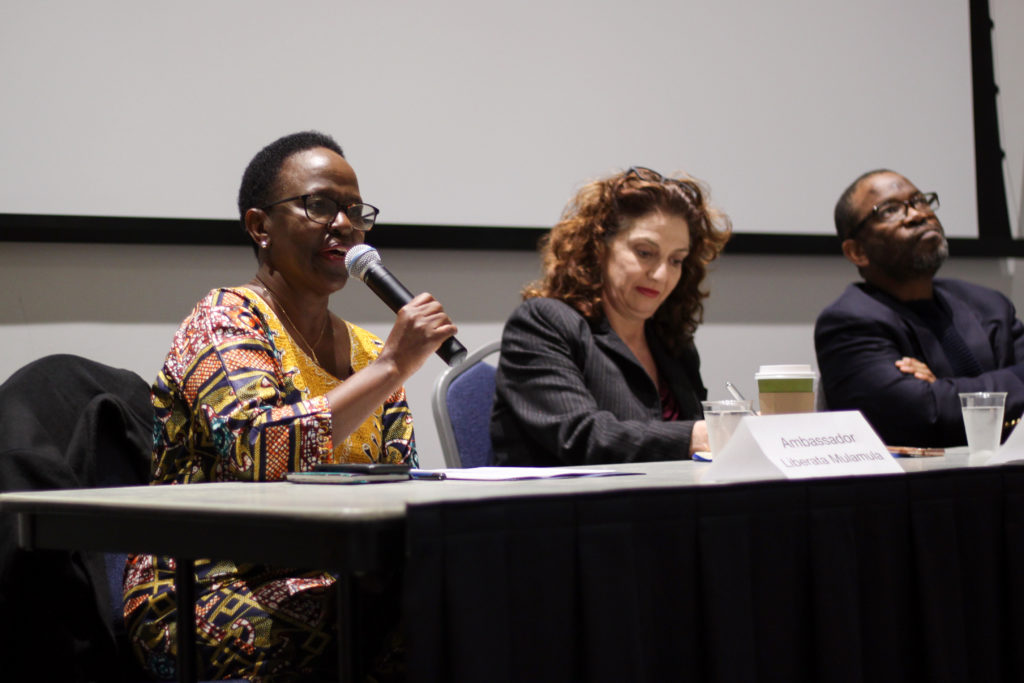Updated: Feb. 9, 2019 at 11:25 a.m.
Four panelists sat in the Marvin Center Wednesday to discuss whether the Colonial is an appropriate name to represent the University.
The discussion, moderated by a freshman representative for the College Democrats, is part of an ongoing debate about the inclusivity of GW’s 92-year-old nickname. The panelists contemplated how the nickname could hurt students whose home countries have been affected by colonialism and urged students to continue discussing alternatives with the wider GW community.
SA Sen. Hayley Margolis, CCAS-U, organized the event in an effort to reignite the call to change the nickname that first gained traction last year. More than 500 students signed a petition last spring calling on the University to switch the nickname to something less “offensive,” like the hippo.
Dane Kennedy, a history professor who sat on the panel, said the Colonial “carries power connotations” when it is discussed in an international context, and students likely do not think of the political implications of colonialism around the world.
“If you asked a lot of Americans what ‘Colonials’ mean, they wouldn’t associate it in any way with anything we said at this forum – what they would identify ‘Colonial’ as is a style,” Kennedy said. “I would suspect this is true of most GW students too.”
Liberata Mulamula, a former Tanzanian ambassador to the United States, said she was dismayed to visit GW and see the University’s connection to the term because her home country was negatively affected by colonialism.
“When you go to the office of financial aid and see ‘Colonial,’ when you go to the health center and see ‘Colonial,’ you are reminded of a very bad history,” Mulamula said. “If GW is an institution that gives birth to leaders, we don’t want a repeat to have those leaders that will take ‘Colonial’ as the system of governance, as a system of conquests, because history repeats itself.”
Fran Buntman, a sociology professor, said she does not understand why a “self-respecting” school like GW would want to be associated with the term Colonial. She said students should continue the discussion about colonization and how the term impacts students.
“This is a conversation worth having,” Buntman said. “We can’t pretend we are somehow apart from it, but we don’t need to bury our head in shame because of it. We need to grapple with those contradictions, embrace the advantages we’ve got and find ways to move forward.”
Buntman said she disagrees with the argument that removing the Colonial mascot disrespects George Washington because “the man stood up against colonial rule.”
“He wanted an independent government that was not under the subjugation of the British government,” she said.
Xolela Mangcu, a sociology professor, said a similar anti-colonial effort took place at the University of Cape Town in South Africa, where students protested and pressed officials to remove a controversial statue of Cecil Rhodes, a British businessman who advocated for white supremacy and British colonialism in Africa.
Mangcu commended students for organizing the panel event because “you don’t want issues like this to fest up and boil until the situation is unmanageable.”
“What you guys are doing here is to provide leadership, to anticipate, and it’s a sense of self-awareness – which is critical in any process of change,” he said.
This post was updated to reflect the following correction:
The Hatchet incorrectly reported that the event was moderated by a freshman representative for the SA. The event was moderated by a freshman representative for the College Democrats. We regret this error.




